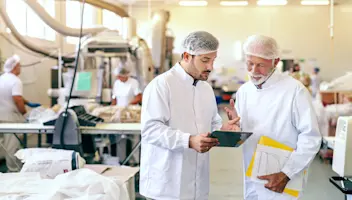Aptean’s Food and Beverage 2021 Global Symposium – How Conscious Consumers & Sustainable Innovation are Shaping the Future of Food Session Recap
Aptean’s Food and Beverage 2021 Global Symposium – How Conscious Consumers & Sustainable Innovation are Shaping the Future of Food Session Recap
Aptean’s Food and Beverage 2021 Global Symposium – How Conscious Consumers & Sustainable Innovation are Shaping the Future of Food Session Recap
7 Oct 2021
John McCurdy
In this second entry in our blog series recapping the sessions of Aptean’s Global Food and Beverage Symposium, we’re providing a rundown of the day’s second keynote session, “How Conscious Consumers and Sustainable Innovation are Shaping the Future of Food” by Danielle Gould, founder and CEO of Food+Tech Connect.
Gould’s insightful presentation painted a vibrant picture of the food and beverage landscape, how consumers’ preferences are changing and the ways in which businesses are adapting to meet these new demands. It’s clear from the statistics and perspectives she shared that the next several years will be filled with exciting developments for our industry.
The Rise of Conscious Eaters
Gould began the presentation in earnest by defining the term conscious eater—these are consumers who see food as part of their identity and use it as a proxy for control, community and purpose, and their numbers are increasing rapidly.
They’re already having a substantial impact on the food and beverage world, as big food companies are losing market share, including $12.1 billion so far in 2021 alone. Meanwhile, small- and mid-sized companies accounted for 46.4% of consumer packaged goods sales in 2015, and that figure has continued to climb in the years since.
Natural products are also becoming more popular, and that sector is expected to top $400 billion in global worth by 2030. Conscious eaters are pushing them to the forefront as part of their three-fold focus on flavor, health and sustainability, and the latter two of those concerns served as the focus of the next portion of the session.
Focus on Health Benefits from Food
The health and wellness market nearly doubled in size from 2010 to 2018, skyrocketing from $68 billion to $134 billion total worth in that time. Such an explosion in popularity makes sense when one considers that 39% of eaters follow a specific diet or eating pattern, including paleo, vegetarian, vegan or one of many other lifestyles.
The prevalence of these groups has given rise to the term “food tribe,” and they represent a significant amount of buying power. The gluten-free tribe, for instance, is responsible for roughly $5.6 billion in spending, while the plant-based tribe tops even that lofty figure with $7 billion behind it.
Functionality is another buzzword in the industry, with 1 in 3 online conversations about food centering on the topic. That translates to 20% of consumers seeking health benefits—such as weight management, increased energy or digestive health—from the foods they eat.
That trend, in combination with the many health issues that individuals face, has led to greater demand for transparency and clear communication from manufacturers via the labels they place on their products. Gould pointed out the excellent example of Simple Mills crackers, which have a prominent and easy-to-read ingredients list on the box that makes understanding their composition much easier for shoppers.
Demanding Sustainability from Food Manufacturers
It’s no longer enough that a food and beverage business’s products are healthy and taste great—today’s consumers believe strongly that brands have a responsibility to fight climate change, and they’re willing to take their money elsewhere if a company does not meet that expectation.
The International Food Information Council reported that 42% of the public believes their food and beverage choices impact the environment. The COVID-19 era has strengthened this conviction, with 2/3 of respondents on a McKinsey survey saying that it’s become more important to limit the impacts of climate change in the wake of the pandemic.
Interestingly, shopping local is now seen as a good approximation for sustainability and community support, and NPR noted a spike in community supported agriculture not long after the nationwide shutdowns in the spring of 2020. In fact, whether a product is local ranked as the top environmental issue for consumers according to a late-breaking report from Beef & Lamb New Zealand, right behind matters of goods’ organic nature and carbon footprint.
Speaking of organic, those products also continue to see growth, reaching $56.5 billion in sales in 2020, a 13% increase from 2019. Shoppers that either tend toward or exclusively purchase organic items certainly are another “tribe,” and organic varieties of traditional foods are all over store shelves to serve them.
Another category seeing continued expansion is the aforementioned plant-based market, which arrived at its lofty $7 billion total on the strength of 2020 sales growth at a rate double that of overall food sales. These products are seen as both better for you and for the planet. While big brands like KFC are piloting plant-based meat menu items, new players like NotCo (producers of NotMilk) are basing their business in the sector.
Regenerative agriculture—which ties soil health to climate change mitigation, flavor and nutrient density—is another development to watch on the sustainability front. The Food For Climate League reported that 54% of Americans are “very interested” in purchasing and eating foods that help their local community and farmland become more resilient to climate change, providing a compelling reason for companies to look into these growing methods.
Applegate Farms, Moonshot Snacks, Row 7 and Jennifer Garner’s Once Upon a Farm have all embraced the regenerative agriculture model, and even bigger names are on board as well. Nestlé, General Mills, Danone, Walmart, PepsiCo, McDonald’s and Waitrose are also on the bandwagon, all announcing initiatives in the past two years.
One final trend to consider as far as sustainability is concerned is the importance of involving equity and justice in the equation. Foodservice outlets are experiencing an extreme shortage of workers amidst wage and working condition issues, and Americans are largely taking the employees’ side, with 60% saying that fair and equitable treatment of food workers is important to them.
Innovating to Achieve Sustainability Goals
As part of her work with Food+Tech Connect, Gould has identified five key elements to a “regenerative innovation paradigm” that will make the food and beverage industry healthier at a holistic level:
Ecological and social systems resilience
Equity and value creation across the system
Circular agriculture and economy
True cost accounting
Emphasis on adhering to ethical standards
She went on to outline her company’s efforts in creating concept products that focus on future outcomes and environmentally friendly production practices. One example that was successfully brought to market is Crop Crackers, which use different kinds of wheat based on the time of year, giving the soil time to recover and come back to planting conditions that preserve the land’s viability for growth.
With a forward-thinking mindset and ambitious mission to improve the food and beverage market, Gould and Food+Tech Connect are poised to continue to add to the conversation going forward. The fact that such pioneering minds are advocating for positive change and pushing for progress in matters of health and sustainability ensures the industry is in good hands for the foreseeable future.
Technology will undoubtedly play an increasingly important role going forward as well, and we’re proud to be a part of that here at Aptean with our superior solutions for food and beverage businesses. Built on the reliable and familiar framework of Microsoft Dynamics 365 and packed with features tailored to tackle the specific challenges of each segment, Aptean Food & Beverage ERP is a foundation for digital transformation that more and more organizations trust.
Contact us today if you’d like to hear more about what our offerings can do for your company.
Be sure to check back for more of our session recaps; and in case you missed it, check out our post on the other keynote presentation delivered by Kevin Prouty from IDC. And if you’d like to view any of the Food and Beverage Global Symposium sessions on-demand, you can do so here.
Related Content





Get in touch today to speak with an expert in your industry
To grow your business, you need a food ERP built specifically for your industry challenges. We're ready to help—reach out today and we'll help you find the right solution.



